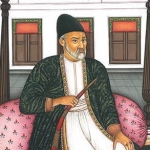ONE
The First Invention, ear laid to earth, is listening
to the fingerlength underground beings moving in segments
through tiny tunnels; one inch shrugs out another,
as bamboo climbs in segments, joint by green joint ...
Or an inexpressive mask that must travel
the world, uphill and down, always keeping its own
counsel, impelling forwardfrom inward—
unspelling a logic that cannot look out or see.
Or a thought that recurs, till one wonders
whether Bach’s theme, without cause, or pause,
is like a cat in a night-closet, the cat evenly leaping
from level to level; the theme that sinks down
into one hand, next leaps to the other, reprises itself,
then doubles down softly, a counterpane on a shelf.
SIX
Have you ever noticed, in Piranesi’s Carceri
d’invenzione, the tiny repeating figures in the foreground?
Brittle, frugal, fugal, they ignore that above them
stairways rise out of sight, and somewhere else
collapse, in-swallowed, devolving through walls or domes.
The same way Bach’s motive splays out to the right,
swoons flatly, swans it, footnotes, follows up,
talks to itself, purls, mutters, dawdles, resumes ...
Six is playing at infancy, one three five,
that’s all baby knows, a block pile clumsily building.
Then the tall chord falls sideways—pretends
it’s a melody—everyone knows it’s a chord—
or a problem in long division which at one point just sticks
on that endless, that déjà vu decimal, six six six ...
ELEVEN
Eleven is caterpillars, two, marching: the one
stave of thick-barred sixteenth notes set down
precisely beneath the other, tiptoe to toetip,
close-clinging, rising and falling and mirrored:
one looks down and locks the other’s horns,
or its own; the two could be said to be linked
like the locked yet endlessly out-spiraling
spindled ribbons of DNA. Yet there’s something
scary, like Cicero’s dizzying concept
of motus animi, hurtling mind unstoppably inventing
figures on figures, yet with no vanishing point,
a world of ladders or stairwells
where space keeps revolving, welling up into space
endless, unfree, unfolding like stairs in a case.


















Comment form: